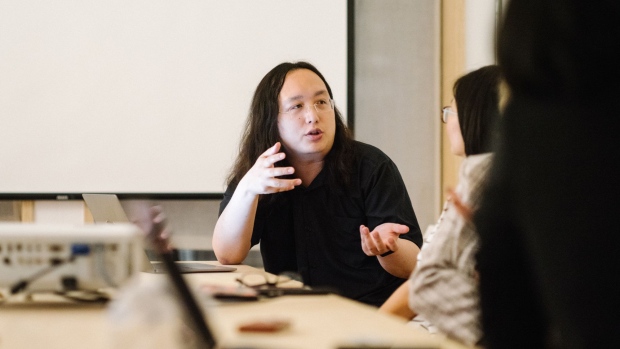Nov 1, 2020
Women Are Leading Taiwan’s Public Relations War Against China
, Bloomberg News

(Bloomberg) -- In the battle for public opinion between China and Taiwan, Beijing has many advantages over its neighbor: the ability to leverage the world’s second-largest economy, an influential diplomatic corps and vast resources.
Diplomatically isolated, the democratic island of Taiwan has amplified its message and pushed back against Chinese propaganda with one of the few things Beijing doesn’t have many of -– high-profile women taking the lead in defending the government’s interests.
Hsiao Bi-khim is on the front line of that effort in the U.S., Taiwan’s most important strategic partner. Taipei’s representative -- and de facto ambassador -- to Washington, Hsiao has wasted little time in pushing for stronger American ties since she arrived in Washington this past summer.
Taiwan’s first female president, Tsai Ing-wen, is leading a diverse group of women holding key positions in the government, aiming to raise its international profile at a time when China is attempting to block its neighbor from the global conversation –- and warning of a possible invasion. The women running Taiwan are looking to boost a soft-power edge over Beijing and promote an inclusive democratic system.
“I’m proud that Taiwan has one of the highest rates of women in politics in Asia,” Hsiao said in an email. “Over 40% of our legislature is comprised of women, many with diverse backgrounds ranging from academia, NGOs and the private sector.”
Taiwan and the U.S. lack an official diplomatic relationship, though bilateral channels are the most open they’ve been in four decades. Hsiao is pushing for even closer ties, recently telling the Washington Post that it’s time to adjust the concept of “strategic ambiguity” regarding whether the U.S. would come to Taiwan’s aid if it was attacked by China.
“We need some degree of clarity,” she said. Asked about the staunch support of Washington’s China hawks in the face of a growing Chinese threat, she told the newspaper, “I have not considered at all the possibility of too much support for Taiwan.”
Messaging Campaign
Hsiao has been going all out on the messaging front. Besides the Washington Post interview, she’s had a guest spot on NPR’s “All Things Considered,” interviews with Politico and the Asia Society, a talk organized by Columbia University and another with Kelley E. Currie, U.S. Ambassador-at-Large for Global Women’s Issues.
Hsiao “has quickly established a presence in the U.S. and is effectively communicating Taiwan’s policies despite the challenges posed by Covid-19,” said Bonnie Glaser, director of the China Power Project at the Center for Strategic and International Studies in Washington. “It is well-known that she has a direct channel to Taiwan’s president and therefore many people want to engage with her, from Congress to the executive branch, think tanks and media.”
The U.S. is the only country willing to sell arms to Taiwan, and it is also the most likely to come to its aid should China attack. Hsiao’s visible approach to diplomacy comes as the U.S. government is showing its strongest support for Taiwan in decades, with the State Department approving two arms packages worth a combined $4.2 billion.
Political Background
The daughter of a Taiwanese father and an American mother, Hsiao, 49, grew up in the southern city of Tainan before studying in the U.S., where she obtained a bachelor’s degree in East Asian studies from Oberlin College and a master’s degree in political science at Columbia University. Politics drew her to Taiwan’s Democratic Progressive Party, which she began working for stateside as an activity coordinator before returning to Taiwan and joining its international affairs division.
Hsiao moved up in the party’s ranks and in 2001 she won her first legislative election, giving up her U.S. citizenship before taking office. As a four-term legislator, she championed progressive causes including same-sex marriage, and sat on the foreign affairs and national security committee. Before relocating to Taiwan’s unofficial embassy in Washington, Twin Oaks, Hsiao served Tsai as a national security adviser.
Females Forward
Hsiao’s role in Washington offers a stark contrast to Chinese diplomacy, which is overwhelmingly male.
“Women have virtually no influence on important matters in Beijing,” Glaser said, noting that there is only one woman serving in the 25-member politburo at the top of the Chinese Communist Party, and none in the seven-member Standing Committee at its apex.
Taiwan’s legislature, on the other hand, is 43% women, the highest rate of female legislative representation in Asia, and among the highest in the world.
Another of those voices is that of Audrey Tang, who as Taiwan’s digital minister has played a key role in the successful handling of the coronavirus pandemic. Tang, who took her post at age 35 as Taiwan’s youngest-ever and first transgender cabinet member, advocates “radical transparency” by the government and is an architect of a unique system of crowd-sourcing laws.
“Our long-term commitment to gender equality and inclusion has achieved considerable results,” Tang said. “As a democratic and tolerant society, the government and the people are always listening to each other’s voices.”
Twitter remains the main platform for delivering Taiwan’s message to the world. Tsai now has more than 1.3 million followers on Twitter, which she recently highlighted with her successful outreach to Indian Twitter users. Tang has more than 130,000 followers, and Hsiao, who only recently became active on the site, is followed by nearly 35,000.
In a recent tweet commemorating Taiwan’s National Day, Hsiao wore a mask with the U.S. and Taiwanese flags and the words “Taiwan-U.S.A. Stronger Together,” highlighting the millions of masks that Taipei has donated to the pandemic-hit U.S.
©2020 Bloomberg L.P.